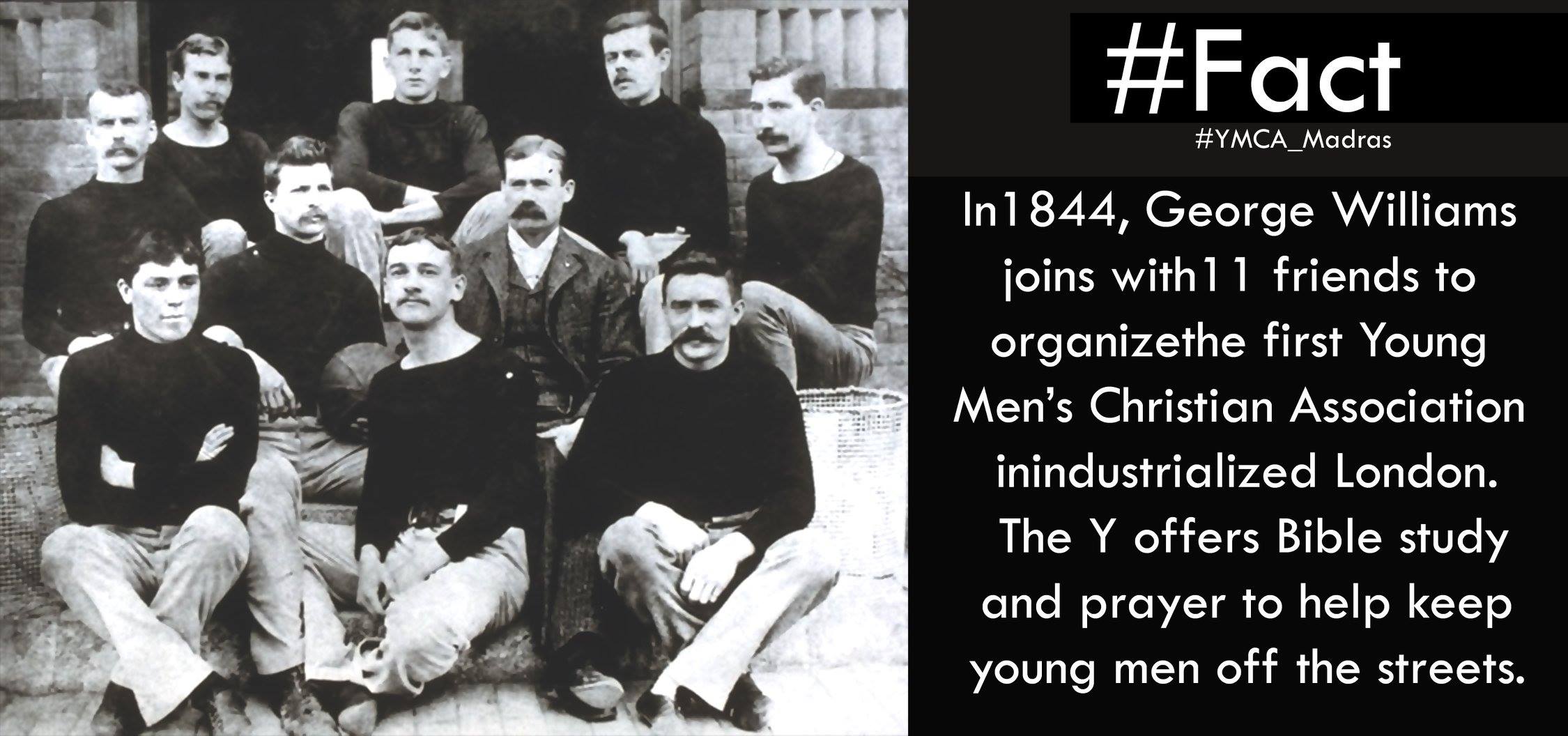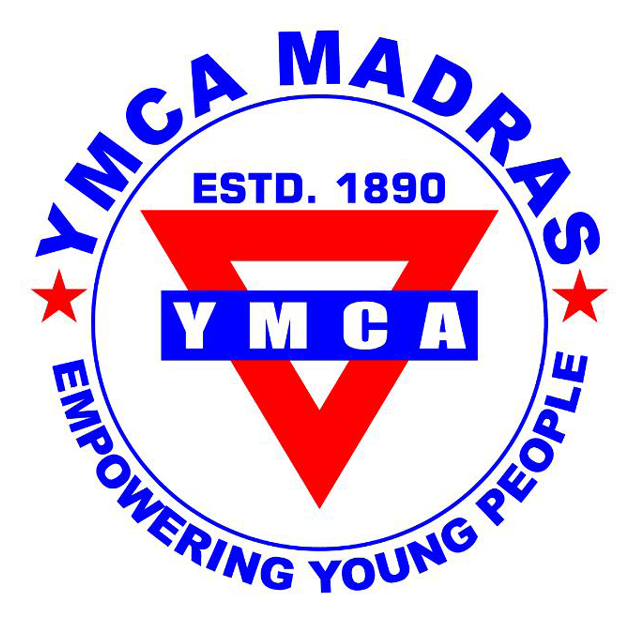YMCA Madras History
“Meet The Team Who Made The History”
Our Story
Being an oldest NGO Network, found in 1890, YMCA-Madras loves to nurture life in various ways as we believe, it is the best gift bestowed upon human beings. Imagine a life full of suffering, depression, anxiety, mood swings. YMCA can understand that, as we completely envision on “Empowering Young People”. Health, Fitness and Wisdom are connected in such a manner that if one flips, the other get effected too. To juggle these three perfectly, one ought to attain and maintain a flawless balance in his life. YMCA-MADRAS is one such crowning platform for juggling these to gain absolute happiness through the mind, body and soul well-being
Our Commitment to Youth
The youth are also in help to imbibe leadership qualities through UNI-Y and HI-Y for college and school students respectively. They enable youth to bring out their innate talents and prepare them for facing the challenges ahead. The YMCA also runs community centers with night school and recreational facilities for the downtrodden in slum areas, alwats in ommunion with the substratum of society.
YMCA MADRAS-1890
The National Council of YMCA’s was formed in Madras to co-ordinate the activities of the association all over the country. This again was the brainchild of Mr Mc Conaughy. In 1908, A home for Christian students was opened on Jones Street and by 1911 there were two more hostels in Chintadripet, Vepery and Royapettah.
Our object
Established the YMCA
On 6th June 1844, George Williams, together with ten Christian young men, established the YMCA. “Our object is the improvement of the spiritual condition of the young men engaged in houses of business, by the formation of Bible classes, family and social prayer meetings, mutual improvement societies, or any other spiritual agency.”

132 Years of Service to the Humanity by Madras Y.M.C.A
The objects in maintaining a hostel was not merely to provide shelter to young men of kindred spirit but also inculcate in them a sense of fellowship, brotherhood and Godliness by making them shun fissiparous propensities. The YMCA also aimed at
playing a positive and constructive role in their lives in building character along right lines. Unfortunately, circumstances forced the closure of most hostels in recent years. But the concept has not immersed into the ephemeral as even now the Royapettah YMCA offers such facilities. Besides, guestrooms are available in a few branches on a daily rental basis.


Another noteworthy program was the course in book-keeping and commercial correspondence started by the YMCA even before the dawn of this century – 1891 to be precise. This paved the way for the College of Commerce (now defunct) through which students were prepared for examinations of the Indian Merchants Chamber, Bombay, the London Chamber of Commerce, the Corporation of Accountants Glasgow, the Institute of Book-keepers, London and the Indian Institute of Bankers. The Madras YMCA was for long the centre of London Chamber of Commerce exams in Asia. It had to be discontinued because the course started shedding luster with students plumping for state Government recognized course.
- From the very beginning, the YMCA has been consistently holding the view that physical education has a crucial role to play in the development of character as well as body. Its physical department was under the charge of Dr. L.H. Beals until 1915 when Dr.Noehren arrived from the U.S. and took charge. Under his tutelage, the first YMCA playground was opened in 1917. But it was the physical director of the YMCA, Mr. Harry Crowe Buck, holding an absolute sway over physical activities, who provided a pioneering push to the field. It was through his ceaseless efforts that the YMCA training school of physical education was opened in 1920 in Esplanade. It was the first such institute on the country. From Esplanade it moved over to Royapettah in 1923 and again from there to the present site at Nandanam, donated by the then Government, in 1932 to be called the YMCA College of physical education.
- The All-India Olympic Association also owes its establishment in 1924. The Olympic movement in the country had picked up momentum only through the efforts of Mr. Buck, whose patronage of Sir Dorabje Tata. Mr. Buck, whose books are followed by many schools, was even the coach for the first Indian Olympic team, and physical education Adviser to the Government. The piece of land opposite the Madras Medical College, now occupied by the nurses Quarters, had first been allotted to the YMCA for use as a playground.
- Besides the YMCA’s concern for destitute is reflected in the two orphanages it runs in the city Called the Boys Town, the two are located in Fort and Kottivakkam, the first of which came into being in 1947. Its roots could be traced to the Junior Department opened in 1901 and later rechristened as the Boys Department, which received the attention of Mr. Wallace Forgie. However, the boys Town concept was formulated by Mr. Lawrence C. Burr. Bringing destitute and abandoned Children into its fold, it provides them with all the basic necessities, including education, until they become independent. The boy’s town now even trains the blind in metallurgy and other job-oriented skills.
- A Plethora of clubs were floated to nurture every segment of life. This included the Live a Little longer club with emphasis on physical exercise and the Camera club with dark room facilities. The art of public speaking in English and Tamil is also being promoted by the YMCA. The institute of public speaking, Toastmaster’s Club, Brains Trust and pattimandram are some bodies connected with the YMCA involved in helping tap the gift of the gab among youth. The past president of India, Mr. R. Venkataraman, was an active participant in the programs of the institute of public speaking. Even Mr. C. Rajagopalachari and a host of other luminaries like Dr.LakshmanaswamyMudalier and Sir. C.P. Ramaswamy Iyer had frequently visited the YMCA and evinced a keen interest in its activities.
- There were also in the Tamil ValarchiKazhagam and the “Conversazione” through which informal discussion on lively topics were organized between the members and eminent men. The Athenaeum, set up in 1930, was another oratory forum. While some of those clubs have folded up now, some continue to be active. Thus, the YMCAs are always abuzz with activity.
- The youth are also in helped to imbibe leadership qualities through Uni-Y and Hi-Y for college and school students respectively. They enable youth to bring out their innate talents and prepare them for facing the challenges a head.
- The YMCA also runs community centres with night school and recreational facilities for the downtrodden in slum areas, always in communion with the substratum of society.
- Though the control of the YMCA is open only to active communicants of churches, a devout Hindu, Late O.KandaswamiChettiar, was on its Board of directors early this century. He had written the book, “Pioneering with Christ” and was the moving spirit of the Golden Jubilee Celebration of the YMCA in 1940.
For nearly five decades since inception, the leadership mantle was successively donned by Americans who had made “Service before self”, their guiding beacon. The British were, however, associated with it as honorary presidents for long, the first of whom was W. Reierson Arbuthnot. Besides, for more than a decade from a legal luminary, Mr. S. Sathianadhan was on its Board. In 1933, it was time for an Indian to take over the reins. Mr. G. Solomon then became the first Indian General Secretary of the Madras YMCA. With his dynamism and saviour-faire he proved to be a worthy successor of Mr. Dalton F. Mc Clelland who incidentally had assumed office in 1919 after Mr. Mc Conaguhy started devoting much of his time to the National Council of YMCAs of India, Burma and Ceylon. A powerful speaker and a disciplinarian, Mr. Solomon was an endearing leader, being both warm and simple. He would tread miles by foot, even in his 80’s visiting slum areas and extending help to the needy. It is indeed appropriate that, by sheer coincidence, 1990 also marked the birth centenary of Mr. Solomon.
Mr. Solomon was succeeded by Mr. O.V. Alexander in 1950 who too kept the YMCA flag flying high. It was under the General Secretary ship of Mr. Alexander, endowed with a disarming sense of humor, that the YMCA acquired new building, following a campaign launched with the terse slogan “Building for Brotherhood. However, it was Mr. Solomon who helped the YMCA in acquiring the site on Ritherdon Road for its Vepery Branch. The noted industrialist Mr. A.V. Thomas, spearheaded the Building a Better Madras campaign in 1960 (he was then the president of the Madras YMCA) under the direction of Mr. Dick cooper a fraternal Secretary, and adequate funds were raised to construct new buildings. Capt. D.Gnanaolivu, the Chairman of the State Housing Board, was president of the YMCA from 1962 and chipped in his might in the effort. That apart, the site on which the YMCA, Kilpauk started functioning was donated by Mr. Jacob Mathi (brother of Mr. John Mathi). Mr. V.R. RamanathaIyer also made a generous contribution of Rs. 50,000 during the campaign.
The Madras YMCA has 11 branches at the following places 1. Esplanade 2.Royapettah 3.Vepery 4.Kilpauk 5. Kodambakkam 6.Royapuram (7) Kodaikanal 8.Kottivakkam 9.Egmore 10.Sathuma Nagar & 11.Tondiarpet in all there are about 30,000 members attached with various branches.
The fundamental principles welded into the body politic of the YMCA are
It should be the work of young men for young men.
Its privilege should be accorded to all young men, without distinction of any kind.
Its aim should be to meet the needs of the whole man –ministering to the intellectual, social, physical and spiritual wants of the people.
In keeping with the objectives, the YMCA, in right earnest, opened a reading room and a social room with recreational facilities at inception.
Classes were conducted on a variety of subjects, lectures organized on moot points and training provided to youth in games such as chess, cricket and table – tennis. It even had a gymnasium well – stocked with the latest equipment. Most such facilities and much more, continue to be extended to its members even now. The hallowed precincts of the YMCA also had a Soldiers Department.
“The purpose of the Associations is the making of the perfect man, suggested by the YMCA emblem, the equilateral red triangle with its apex down, who shall have the muscle of an athlete, the mind of a scholar, the manners of a gentleman and the pure loving heart of a Saint. Though the YMCA was by then functioning in some cities, only the one in Madras could take credit for being the first to be started by a YMCA Secretary from abroad, sent for that specific purpose.

- In 1891, the National Council of YMCA’s was formed in Madras to co-ordinate the activities of the Association all over the country. This again was the brainchild of Mr. Mc Conaughy.
- In 1908, a Home for Christian Students was opened on Jones Street and by 1911 there were two more hostels in Chintadripet. The Vepery and RoyapettahYMCAs took the cue and opened hostels
